
During the fall and spring semesters of 2015-16, she participated in the South Asia Center’s C.U. in India program, which began with a semester in the classroom with an introduction to the topic and study of gender and development in India. Lauren then spent the winter break in India completing her in country course requirements, and later completed her research project for the course in the spring. Her research project was inspired by in–field observations and research and analysis, and brought together theory and practicum on the topic.
"My research project was carried out in Kolkata's largest red light district, Sonagachi, during a period of five days in December 2014. Taking Durbar Mahila Samanwaya Committee (DMSC), an organization run by and for sex workers, as a case study, I explored identity politics within a movement like that of Durbar while highlighting the importance of intersectionality as an adjunct tool of empowerment to collectivization.By defining the concept of empowerment as a bottom-up process focused on the inclusion of marginalized voices and the redistribution of power and resources, I argued that the process of establishing a collective identity is essential to address the practical needs of groups that are deprived of their basic rights due to stigma, discrimination, and criminalization propelled by the state and society at large. I provided fieldwork-based evidence to show how DMSC has broadened the scope of its collective identity over the years through alliances with LGBTKH groups, children of sex workers, and domestic workers, among others. These alliances have provided a wide network of financial, moral, and political support to mobilize multiple marginalized populations on a single platform in order to challenge patriarchy as an element of the larger oppressive capitalist system.
One of the most valuable skills I acquired from participating in the program was a deeper understanding of feminist research methodologies, which required developing an awareness of my identity and background in order to avoid objectifying the subjects I interviewed and engage instead in a collaborative production of knowledge. Another key skill was conducting fieldwork in a culturally sensitive environment. As students coming from a Western university, it was important to learn how to behave in a place like Sonagachi, what kind of questions to include in interviews, what information to look out for, and how to incorporate previously acquired knowledge on feminist theory into our projects.
Lastly, development non-attachment to my research's results was another huge lesson. Before traveling to India, it was easy to come up with an exciting topic to write a paper on; but once we all got of the airplane, the real challenge was to learn to adapt to the research opportunities available and to genuinely learn from the reality I was experiencing instead of trying to pick and choose information that would fit my original proposal.
The most rewarding aspect of the project was challenging my previous perceptions of sex work that had been largely influenced by Western abolitionist feminists. Going through such an immersive experience with DMSC taught me to take a step back and to contextualize issues according to people's realities.
Having the opportunity to travel to India was obviously a huge one too since it was my first time there. It was very rewarding to have such a unique introduction to Delhi and Kolkata through our interactions with the Center for Women’s Development Studies and Durbar. Traveling with other students and my professor was also a lot of fun, as we shared so many memorable experiences from late night conversations on feminist movements to non-subtitled Bollywood films.
This course has definitely shaped my approach to research and grassroots activism, which I have been involved in for the past few years, and will surely be valuable when I start traveling through the "developing" world later this year. Writing this paper helped me develop a deeper awareness on how I approach different issues and the experience overall will be great to resort to whenever I travel again to South Asia and when I engage in work with non-profits and community-based initiatives."

 South Asia Studies
South Asia Studies